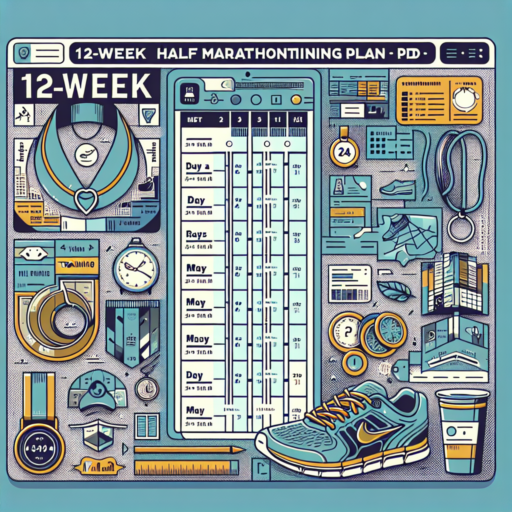Introduction to the 12-Week Half Marathon Training Plan
Embarking on a half marathon journey is a formidable yet exhilarating challenge. The key to crossing the finish line with confidence lies in a structured and progressive training plan tailored to your current fitness level and goals. Our 12-Week Half Marathon Training Plan is designed to guide beginners and seasoned runners alike through a comprehensive preparation process, ensuring you are race-ready.
This specialized program incorporates a blend of running, strength training, and recovery periods, aimed at gradually increasing stamina, improving speed, and enhancing overall running efficiency. Each week of the plan builds upon the previous one, carefully balancing intensity and volume to optimize performance while minimizing the risk of injury. The structured approach ensures a steady progression towards achieving the 13.1-mile goal, making it achievable for runners of varying abilities.
Success in a half marathon hinges not just on physical preparation but also on mental readiness. Our 12-Week Half Marathon Training Plan includes tips and strategies for staying motivated, setting realistic goals, and mentally preparing for race day. Whether you’re aiming to complete your first half marathon or looking to set a personal best, this comprehensive guide provides the tools and guidance necessary for a successful and fulfilling race experience.
Week-by-Week Breakdown of Your Half Marathon Training Schedule
Embarking on a half marathon journey is exhilarating, but without a clear roadmap, it can quickly become daunting. A structured week-by-week plan not only sharpens your endurance and speed but also minimizes the risk of injury. Tailoring your training to gradually build up intensity and mileage ensures a smoother transition to race day.
Initial Weeks: Building a Foundation
The first few weeks of your half marathon training are crucial for establishing a solid base. Focus on comfortable, easy runs to condition your body, gradually increasing your weekly mileage. Incorporating strength training sessions during these weeks is also paramount to fortifying your muscles and joints for the road ahead.
Mid-Training: Intensity and Endurance
As you progress, it’s important to introduce more challenging workouts into your regimen. Interval training, hill repeats, and tempo runs become key components of your schedule. These sessions are designed to improve your speed, efficiency, and cardiovascular strength, crucial for achieving a successful half marathon performance. Remember, the goal is to push your boundaries while allowing adequate recovery periods to avoid overtraining.
Ultimately, a thoughtful week-by-week breakdown of your half marathon training schedule illuminates the path to the finish line. By diligently addressing each phase of training, you’re not just preparing for a race; you’re embarking on a transformative journey that enhances both physical and mental resilience.
Essential Gear and Nutrition Tips for Half Marathon Success
Preparing for a half marathon requires a blend of correct gear selection and an apt nutritional strategy to ensure peak performance. Runners should focus on acquiring lightweight, breathable, and comfortable running attire that complements the weather conditions on race day. Equally, understanding the right nutrition can significantly impact your training and race day experience, enhancing endurance and recovery times.
Gear Essentials for Peak Performance
Choosing the right gear is paramount for your half marathon journey. Essential items include a pair of high-quality running shoes that match your gait, moisture-wicking running clothes to keep you dry, and a comfortable running belt or arm band to carry your essentials without hindering your performance. It’s also wise to invest in a good quality sports watch to monitor your pace and progress. Remember, the key is in selecting gear that feels as if it’s barely there, allowing you to focus solely on the race ahead.
Nutrition Strategies to Fuel Your Run
When it comes to nutrition, balancing carbohydrates, proteins, and fats is crucial for sustaining energy levels during your half marathon training and the race itself. Carbohydrates are particularly important for runners, as they provide the most efficient form of energy for endurance sports. Incorporating energy gels or chews can also help maintain glucose levels, especially during long-distance runs. Remember, hydrating well before, during, and after your run is key to avoiding cramps and ensuring recovery. Tailoring your nutrition to your training can make a significant difference in your performance and enjoyment of the half marathon.
Customizing Your 12-Week Half Marathon Plan for Beginners and Advanced Runners
Finding the right balance in a half marathon training plan can be challenging, especially when catering to both beginner and advanced runners. Customization is key to addressing the unique needs, goals, and fitness levels of each individual. Whether you’re just starting out or looking to beat your personal best, a tailored 12-week half marathon plan can set you up for success.
For Beginners: Building a Solid Foundation
Beginners should focus on gradually increasing their mileage, allowing their bodies to adapt to the new stress of running. The first few weeks are crucial for building endurance and preventing injuries. Incorporating rest days and low-impact cross-training activities can enhance recovery and overall fitness. Customizing your plan might include starting with shorter, more manageable runs and slowly incorporating longer distances as your endurance improves.
For Advanced Runners: Fine-Tuning Performance
Advanced runners, on the other hand, might look into more specialized workouts such as speed intervals, tempo runs, and hill workouts to improve their pace and endurance. Customizing your plan could mean focusing on these elements right from the start while also paying close attention to recovery techniques and nutrition. The goal is to fine-tune your performance and push beyond previous limits safely.
Incorporating Rest and Recovery in Your Half Marathon Training
Training for a half marathon is as much about building endurance and speed as it is about understanding the necessity of rest and recovery. Incorporating adequate rest days and recovery techniques into your training program is paramount for avoiding injuries and improving performance. It might seem like taking a day off could hinder your progress, but in fact, it allows your body to repair itself, making you stronger and more resilient.
Understanding the difference between active recovery and complete rest is crucial for an effective half marathon training plan. Active recovery might include activities such as yoga, gentle cycling, or even a slow jog, which can help improve blood circulation and aid in muscle repair without putting too much strain on your body. On the other hand, complete rest days should be exactly that—total rest, allowing your body to fully recover and adapt to the stresses of training.
Effective Recovery Techniques
- Hydration and Nutrition: Refueling your body with the right nutrients and staying hydrated can significantly speed up recovery.
- Stretching and Foam Rolling: These techniques can help in alleviating muscle tightness and increasing flexibility, leading to improved performance and reduced risk of injury.
- Quality Sleep: Adequate sleep is essential for recovery, as it’s during sleep that your body undergoes most of its healing and repair processes.
Key Workouts and Cross Training for a Balanced Training Approach
Integrating key workouts and cross training into your routine is essential for a balanced training approach. This strategy not only enhances overall physical fitness but also reduces the risk of injury by diversifying the stress placed on different muscle groups. By incorporating a variety of workouts, athletes can improve their endurance, strength, and flexibility in a harmonious manner.
Benefits of a Mixed Workout Regimen
A mixed workout regimen, combining key workouts with cross training, offers extensive benefits. It prevents the boredom associated with repetitive exercise routines and keeps the motivation levels high. Cross training, in particular, allows for the engagement of different muscle groups, promoting muscular balance and reducing the likelihood of overuse injuries. Furthermore, by challenging your body in diverse ways, you can achieve a more rounded form of physical fitness, paving the way for improved performance in your primary sport or fitness goal.
Examples of Cross Training Activities
- Swimming: Enhances cardiovascular health without putting stress on the joints.
- Cycling: Builds lower body strength and endurance while offering a refreshing change from high-impact exercises.
- Yoga: Improves flexibility, balance, and core strength, contributing to better body alignment and function.
Adopting a balanced training approach through key workouts and cross training not only facilitates a well-rounded development of physical capacities but also ensures that your training program remains engaging over time. By wisely selecting activities that complement each other, athletes and fitness enthusiasts can optimize their training outcomes and enjoy a healthier, more active lifestyle.
Mental Preparation Strategies for Tackling Your First or Fastest Half Marathon
Mental preparation plays as crucial a role as physical training when it comes to running your first or fastest half marathon. Approaching the race with a robust mental framework can significantly influence your performance, endurance, and overall experience. Understanding how to harness and cultivate a positive mental attitude and resilience against the inevitable challenge is key.
Setting Realistic Goals
Begin by setting realistic, attainable goals for your half marathon. This doesn’t mean underselling your potential, but rather, acknowledging your current level of fitness and experience to set a challenging yet achievable target. Having a clear, defined goal helps maintain focus and motivation throughout your training and the race itself. Visualize crossing the finish line and how it will feel; this visualization technique can propel you forward during tough training days or moments during the race.
Building a Positive Support System
Surrounding yourself with a supportive community of fellow runners, friends, and family can significantly impact your mental preparation. Joining a training group or running club can offer not only techniques and tips but also encouragement and camaraderie. Sharing your goals and receiving encouragement can boost your confidence and reinforce the belief in your ability to achieve your marathon objectives.
Managing Pre-Race Jitters
It’s normal to experience nerves in the lead-up to race day. Instead of allowing anxiety to overwhelm you, acknowledge these feelings and view them as a sign of your dedication and investment in your goal. Employ relaxation techniques such as deep breathing exercises, meditation, or listening to calming music to ease your mind. Remembering your training, accomplishments, and the support of your community can also help mitigate fears and turn nervous energy into excitement.
How to Taper Effectively in the Final Weeks Before Race Day
The concept of tapering is essential for athletes looking to optimize their performance on race day. Tapering refers to the period of reduced training intensity and volume before a major race to allow the body to rest, recover, and peak in performance. Understanding how to taper effectively in the final weeks before the competition can be the key to achieving your goals. Here’s what you need to know:
Strategic Reduction in Training Volume
One of the most critical aspects of tapering is gradually reducing the volume of your workouts. A common approach is to decrease training volume by 40-60% over a 2-3 week period before the race. This reduction helps minimize fatigue while maintaining fitness levels. It’s essential not to halt training abruptly but rather to decrease intensity and volume strategically to avoid losing any physiological adaptations your body has gained during training.
Focus on Nutrition and Hydration
While reducing physical strain, it’s crucial to maintain a focus on proper nutrition and hydration. This phase is not the time to cut calories drastically, as your body still requires adequate fuel for recovery and sustenance. Ensuring a balanced intake of carbohydrates, proteins, and fats, along with staying well-hydrated, supports muscle repair and prepares your body for the upcoming race day.
Quality Sleep and Stress Management
Equally important to scaling back on training is prioritizing quality sleep and stress management. Adequate rest is vital for recovery, allowing muscle repair and psychological rest, which will enable athletes to approach race day with a sharp, focused mindset. Implement techniques such as meditation, yoga, or light stretching to mitigate stress levels and enhance mental preparation for the competition.
Common Mistakes to Avoid in Your Half Marathon Training Journey
Training for a half marathon is an exciting challenge, but it also requires careful planning and execution to avoid the common pitfalls that can derail progress. Knowing what to dodge during your training can be as crucial as understanding what you should do. Here are key mistakes to avoid on your path to crossing the half marathon finish line.
Ignoring the Importance of a Tailored Training Plan
One size does not fit all when it comes to half marathon training. Many runners make the mistake of jumping into a training regimen without considering their current fitness level, available training time, and personal goals. A tailored training plan accounts for your unique situation and gradually increases your mileage, allowing your body to adapt to the increased demands without the risk of injury. Skipping this step can lead to burnout, inadequate preparation, or, worse, injury, setting you back before race day even arrives.
Overlooking Proper Nutrition and Hydration
Nutrition and hydration are the fuel your body needs to power through training and recover efficiently. Neglecting these areas can significantly impact your performance and overall health. Many runners underestimate the importance of maintaining a balanced diet and staying hydrated, especially during long runs. Incorporating a variety of nutrients into your meals and drinking sufficient water before, during, and after your runs is critical. Proper nutrition and hydration are your allies in preventing fatigue, cramping, and other avoidable issues.
Failing to Listen to Your Body
In the pursuit of half marathon glory, it’s easy to ignore the signs your body might be sending you. Pushing through pain or discomfort can result in serious injuries that could have been prevented with rest or proper care. It’s essential to tune in to your body’s signals and differentiate between minor aches that come with training and more serious pain that requires attention. Taking rest days seriously, incorporating cross-training, and seeking professional advice for any persistent issues are wise moves. Remember, respecting your body’s limits can mean the difference between making it to the start line healthy or not making it at all.
No se han encontrado productos.
Free 12-Week Half Marathon Training Plan PDF: Download and Get Started
Embarking on a half marathon journey is an exciting challenge, and having a structured guide is essential for success. Our Free 12-Week Half Marathon Training Plan PDF is the ultimate resource for both beginner and experienced runners looking to optimize their preparation. The plan is designed to incrementally increase your endurance, speed, and confidence, leading up to race day.
The training plan covers all essential aspects of getting ready for the event, from weekly mileage increases to cross-training sessions. It’s tailored to help you progressively build your running stamina while minimizing the risk of injury. Moreover, the PDF format makes it incredibly convenient for you to download, access on any digital device, or print out and tick off each completed session, keeping you motivated and on track.
Within this comprehensive guide, you’ll also find tips on nutrition and hydration, crucial for maintaining energy levels and recovery throughout your training. The program is structured with varied workouts, including long runs, tempo runs, and rest days, to ensure a balanced approach that enhances your running capabilities. Start your half marathon journey today by downloading our free 12-week training plan, and set yourself up for success on race day.



